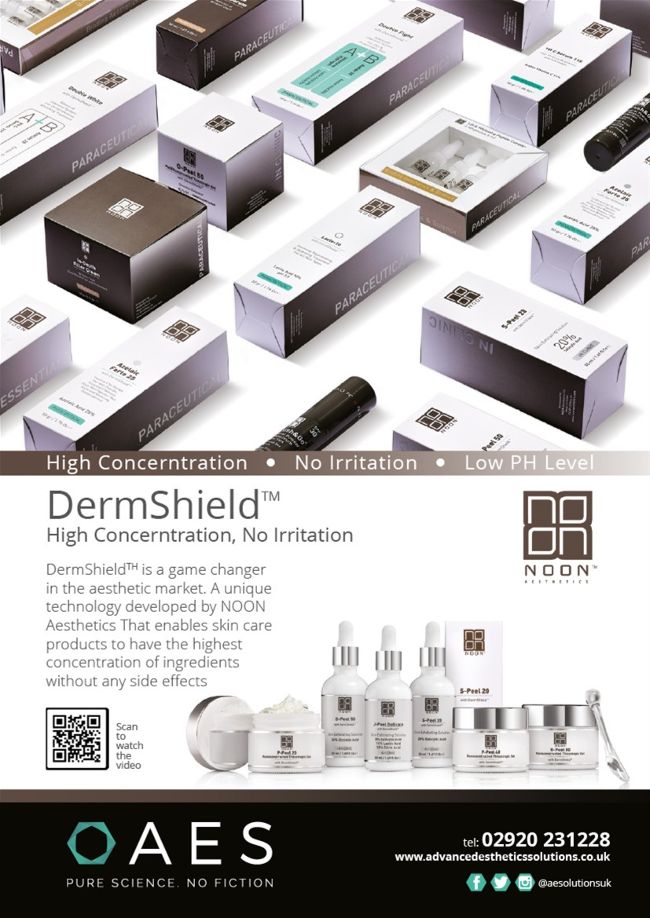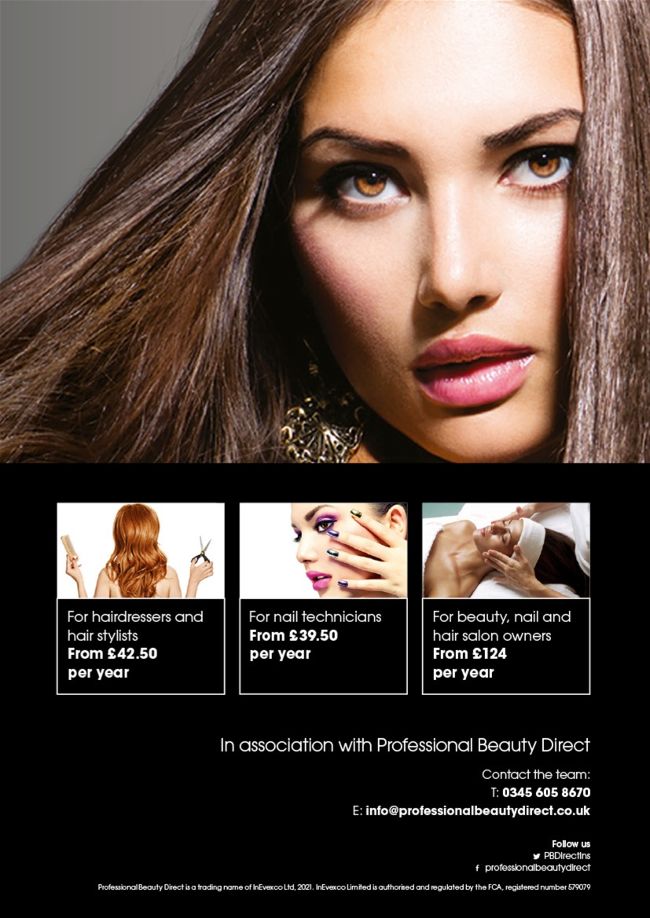HOT TOPIC
UNDERSTANDING HIV IN BEAUTY
Our expert panel debunk some of the myths surrounding HIV and beauty treatments, covering status disclosure and the law, medication interaction, and how to adapt your consultation forms. Amanda Pauley reports
Our panel of experts
Sam Marshall, waxing expert and trainer, owner of The Beauty Guru in Manchester and HIV awareness ambassador
Becky Mitchell, an HIV ambassador who was awarded an MBE for services to HIV awareness, and living well with HIV since 2012
Becky Pang, HIV-positive speaker, and service-user engagement and training co-ordinator for BHA Leeds Skyline
Does discrimination against HIV-positive people happen in beauty salons?
Pang:
“In my job, I’ve met hundreds of HIV-positive people and have heard some stories of discrimination. For example, a trans woman who went to have laser hair removal ticked on the form that she was HIV positive as she thought it might be something to do with medication interaction and, low and behold, they cancelled all her treatments with no reason at all apart from ‘it’s policy’.
“I’ve even experienced it myself. In 2019, I went to get a tattoo and didn’t mention to the artist that I was HIV positive as we met via Instagram and as a HIV activist it’s all over my page. When I saw the question on the form, I told her I was positive and she panicked and looked physically sick. I told her she could call my doctor, who would confirm that there’s no risk of transmission as I was undetectable and that all her hygiene practices would be exactly the same.
“She ended up doing the treatment and we had a chat throughout it about HIV stigma and transmission, and I think she learned a lot. She told me that if I had told her beforehand then she probably wouldn’t have treated me and that’s because of her back knowledge of HIV. She had been taught not to tattoo people with HIV.”
Mitchell:
“I’ve got quite a thick skin but I’ve faced similar situations. I’ve been to places for a massage where they list HIV and AIDS together on the consultation form – ‘Do you have HIV/AIDS?’ – and I’m like, nobody has AIDS anymore. It doesn’t exist anymore because the treatment we have is so good. AIDS definitely shouldn’t be on there but neither should HIV.”
What does U =U mean?
Pang:
“If you take one thing away from this article, then it should be that ‘U = U’ means ‘undetectable = untransmittable’.
Undetectable simply means that an
HIV-positive person’s viral load – the level of HIV in their blood – is so low that it can’t be detected by tests. It means their viral load has less than 250 copies in that bit of blood they take, and in this country, the standard is to have less than 30.
“I had my first test four weeks after being on medication and I was undetectable. For most people, it takes between four weeks and six months. A patient is officially classed as undetectable after two undetectable blood tests, and they are usually tested after four weeks, eight weeks and then three months after starting medication. Then, we continue to get tested every six months.
“Even if someone is on medication but not untransmittable yet, the chances of transmission are really low because that medication is already bringing the viral load down. If a needlestick injury did occur, you wouldn’t only have the HIV virus in that bit of blood, you would also be transmitting a tiny bit of medication in that too, so it is less likely to take hold in someone else’s body.”
Do I need to have HIV on my consultation form?
Pang: “There has never been a recorded HIV transmission from piercings, tattoos or any other cosmetic beauty treatment. It’s incredibly hard to contract HIV in general. It loves that warm body environment, so with things like needlestick injuries or blood splatters, it’s almost impossible to contract it from that. It takes less than a minute for HIV to die outside the human body in a blood spill.
HIV in numbers
Stats from Public Health England (data to the end of December 2019):
105,200 living with HIV (est.)
6% thought to be unaware/ undiagnosed
68,088 of those diagnosed are male and
30,388 are female
98% of those diagnosed are on treatment
97% of those on treatment are undetectable
89% of all people living with HIV (known and unknown) are virally suppressed
“If you ask about HIV on your consultation form, why do you need to know it? How are you going to treat that person differently? Think about these questions because if it doesn’t affect your practice then it doesn’t need to be on your form. Plus, of those who know they have an HIV-positive status, 98% are on treatment and are virally supressed, so there’s no risk. People who don’t know they have HIV are the greatest risk.”
Marshall:
“I spoke to standards-setting body Habia and they confirmed that the rules you should be following [for HIV-positive clients] are our universal hygiene procedures. I also spoke to them about whether beauty college education on this subject should be updated and they said they are going to be doing something around this. Also, if you’re singling out HIV on a consultation form then why aren’t you singling out MRSA or Ebola? A question for me is: ‘Do you have anything contagious that I could catch from you?’, and that’s fine to ask but, again, it should be universal hygiene in treatment.”
What if I want to know about existing conditions/medications to ensure the client won’t have an adverse treatment reaction?
Pang:
“In my opinion, HIV shouldn’t be on your form, but if you are insistent on keeping it then you need to have those follow-up questions – how long have you been on your treatment? Are you undetectable? Then, the best way to pitch [your reasoning for keeping it on the form] to clients is through an open conversation and by making it abundantly clear that you are asking this so you can tailor the treatment to them, not for refusal of treatment if they have HIV. You want to create that safe environment and atmosphere so people feel comfortable sharing something like that with you.”
Marshall:
“If you want to have it on your consultation form to check whether the client’s medication will react with the treatment you’re doing – for example, electrolysis – then do it, but you need to
know for sure that the HIV medication interacts with the service and list these medications. If you don’t know this then you need to back up your reasoning for having HIV on your form.
“ I spoke to Dr Stephen Higgins, consultant physician in the department of sexual health and HIV at North Manchester General Hospital, about HIV medication interaction and he said it does not affect any beauty treatment. HIV-positive people heal the same way as anyone else, so there’s no reason at all to refuse someone treatment because of their medication.”
What is the law around HIV disclosure?
Pang:
“People with HIV are not legally obliged to tell anyone about their status – whether that’s a sexual partner, medical professional or beauty therapist. Some companies still have it on their forms and I think that’s because of fear of transmission and also down to ignorance really. If a company removes it from their form then they have to do research as to why it was there in the first place.”
Mitchell:
“I know lots of HIV-positive people are afraid to be open about their status because of fear of stigma, so a situation [like the tick-box exercise on a consultation form] could be really damaging to their mental health.”

Is it illegal to refuse to treat an HIV-positive person in my salon?
There is a joint statement from the British HIV Association, British Association of Sexual Health and HIV, National Aids Trust, Terrence Higgins Trust and HIV Scotland in regards to reports of discrimination against people with HIV from some providers of cosmetic treatments and tattooing:
“Refusing to tattoo or to provide a cosmetic or routine beauty treatment to a client on the basis of their HIV status cannot be justified. To do so would constitute discrimination under the Equality Act 2010. The Equality Act 2010 prohibits discrimination against a range of protected characteristics.
“In the Act, any person with HIV is protected under the category of disability. Collecting information about HIV status must be justifiable, as per current data protection legislation (Data Protection Act 2018 and General Data Protection Regulation 2018), and is unnecessary in the context of tattooing, piercing, and cosmetic or routine beauty treatments.
“HIV and HIV treatment are not contraindications to tattooing, piercing or cosmetic procedures, so it is not necessary to collect information on HIV when assessing clients prior to these.”

